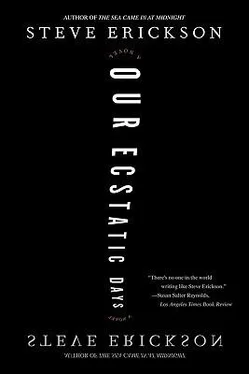the gondola where I came from, when his answer to my call came bubbling up
two days later. Half Indian, half white, he’s never diagnosed someone dying of sorrow, dying not of physical dissolution or even a fatigue of body and spirit as triggered by sorrow, but sorrow itself: Isn’t there somewhere to take her, Brontë asks, a hospital or rest home? The doctor answers that there’s something about this dying that’s beyond the peace of hospitals and rest homes. When she tries to call him again a week later, the phone is out of order. The weeks become months. Outside, the storm is unmoved by the change of seasons, and the arrival of spring.
Brontë discovers a television one afternoon in one of the back suites on the first floor, but as she might have expected, there’s nothing on it except a faint broadcast from Flagstaff, buzzing out of the clouds to the west. Constantly awakened by trains taunting her, constantly gazing out the windows for signs of a light coming up the track, at night she takes to drifting through the dark hacienda and cold cinderblock foyer, past the bare newsstand and forsaken gift shops and faded Indian murals and the bar lined with tequila bottles and cracked martini glasses drunk on their own dust. She scours the stray pieces of hotel literature as well as the volumes of local lore on the shelves; after a while she knows more about the pueblo and the families that built it and lived here than she does her own life. When the storms originally came, the first part of the hotel to have been closed was the dining room, once the finest in the territory. Now for the pueblo’s rare guest Wanda cooks in the hotel kitchen a traditional soup half spicy black bean and half sweet corn, sending it up to Brontë along with lemon slices.
Boarded up after the dining room was the cavernous ballroom, its once-blue ceiling that’s flecked with silver now gray like the overcast sky outside. The small tadpoles of silver flicker like the
from the bottom, so in the same way the night I miscarried him I splashed
lightning’s stray offspring. One night Brontë peeks past the slabs of wood that barricade the ballroom entrance and pulls one away, stepping through; because of how the silver flashes in the dark ceiling, there in the black of the old ballroom she can almost believe there are no ceiling or walls, that there’s no pueblo at all. She can almost believe the massive Navajo carpet across the ballroom floor is a great rooftop floating high above the earth. Actually tottering a bit where she stands, she reaches for the wall to steady herself; before her, a quadrant of the world is ablaze with lightning. It curves in an electric white arc against the black of space. A lake glitters far below to the west, lunar gales howl in the sky below, and pacing the eye of the storm Brontë contemplates the shimmering suture of the northern mesas. For a moment she can almost believe that here one sleeps above her dreams — for good or ill, depending on the dreams.
Lately Brontë has been having dreams of a small boy. Only after she found a crumbling old book on a remote shelf did she learn the story that the official literature of the hotel doesn’t tell: that on the afternoon the great great grandson of the Spaniard who built the pueblo walked out its porticos into the desert, he left behind a sole inheritor of his ruin. This was a three-year-old child who he so refused to acknowledge as his own son that the forsaken mother, a local Indian woman, died giving birth in a ravine just beyond the western garden. Even when the infant boy was taken in by the hotel servants, his cry was regarded by the father as simply a stray sirocco blowing through the abandoned ballroom. Thus three years later, with the hacienda empty of everyone else, on his nonchalant stroll into the desert the newly destitute patrician walked right past the child as though he was invisible, and for hours the little boy stood in the open doorway first watching the disappearance then awaiting the return of the father who had never
myself with him then, splashed him on my face and neck and breasts until I
held or kissed or spoken to him.
Brontë goes back through all the other old books of the hotel to try and find out what happened to the son left behind. But as the forbidden history of the pueblo would have it, he’s still standing in the doorway waiting for his father, and at night sometimes Brontë wakes to his small sirocco-cry from somewhere in the hotel. She presses her ear to the walls listening for him, convinced the brown-haired brown-eyed child scampers up and down secret passages between the rooms looking for his father who’s hiding from him, as though his abandonment has been only a game. Outside, the storms seem to stop moving over the mesas, rather it’s as though the earth continues turning its way into a single endless storm that rolls on and on and on into the coming years.
As Barbrasita gets bigger, she begins lumbering slowly up and down the hall snarling at the growing child inside her in ever blacker language. Even to someone who doesn’t understand the Spanish, it’s awful. In her sleep Lulu hears the girl cursing her unborn baby and murmurs for someone to make her stop. Bronte stands at the window staring for trains and thinks that between the dying woman in the bed behind her and the pregnant girl outside in the hall, perhaps she’ll go insane: Perhaps I will. Then what willthey do, she rages silently, what will they do when I’m crazy. As her belly grows in the passing months, Barbrasita curses it more and Lulu curses back, and this exchange continues until the night Brontë finally wakes to find the Mistress sitting straight up in bed, streaked with the electric frost of the storm outside, eyes wide to the sound of something Bronte can’t hear through the cracked euphonium of the storm, until it trails off in a baby’s cry.
Brontë rushes into the hall of the darkened pueblo. Searching for
couldn’t distinguish the tears of my eyes from the discharge of my uterus, until
the sound of the crying, she finds Barbrasita who, like a cat, has taken her labor into the linen closet, producing a bloody baby between her thighs, umbilical snake singing between them; the young Indian mother seems in shock. Down the dark deserted halls Bronte runs knocking on doors until Wanda appears. Calmly taking a flashlight hanging from a hook, grabbing from the kitchen the knife used for slicing Brontë’s lemons, she follows the crying to its source and, with a single swipe, slashes the cord. Its song howls into silence. Bronte reels. “Can you warm up a pot of water, miss,” Wanda says, “not too hot?”
Barbrasita doesn’t curse her baby anymore after that. In the days after that, she sits in her bed so rapt at the sight of the little boy that she almost has to be reminded to feed him, his small hands pawing her breast. Trying to explain it’s not a good idea for the two to sleep together, Wanda has to gently pry the child from the mother’s arms: You could roll over on him dear, she says, wedging the baby on his side in a small makeshift cradle a few feet away. Commissioned to keep an eye on the infant while Barbrasita sleeps, Brontë fumes. It’s very convenient for everyone isn’t it.It’s very convenient that a train abandoned me here so I could baby-sit a dying woman and a newborn. Brontë feels no affinity for babies. She believes she has a man’s sense of privacy that doesn’t accommodate babies. But as more weeks pass and she tires of watching for trains in whose arrival she has no more faith, she finds herself looking in on the baby anyway, even when the mother is awake. “Just thought I should check,” she tells the Indian girl. “Force of habit.”
Later, almost four hundred days after coming to the Pueblod’Elektrik, standing out on the station platform one night and seeing at long last, long after faith’s exhaustion, the small distant
Читать дальше











